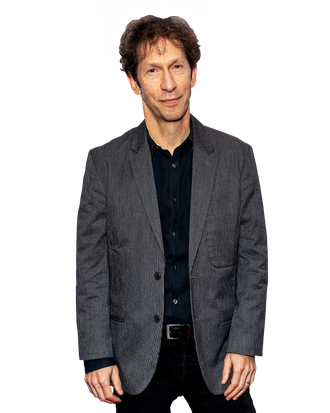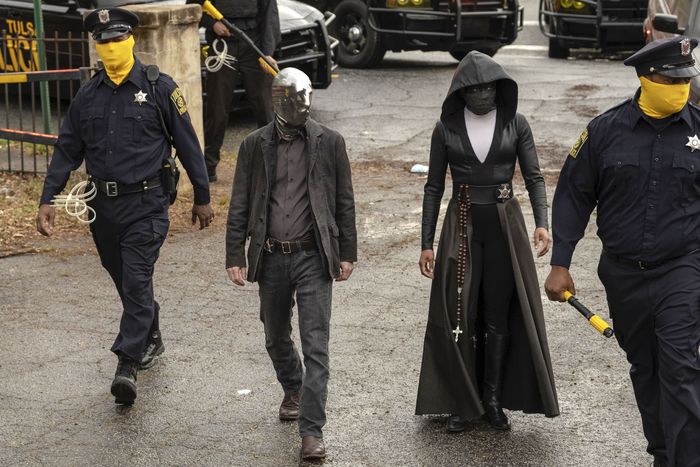
In Sunday night’s episode of Watchmen, the HBO series goes behind the mask of one of its most impenetrable characters: Looking Glass, a.k.a. Wade Tillman, a.k.a. that guy who wears a shiny mask made of “reflectatine.” The hour opens with a flashback, where we learn Wade was once a young religious zealot who took a very ill-timed trip to Hoboken, New Jersey on November 2, 1985, the day Ozymandias dropped a giant psychic squid on New York. He barely survived, thanks to the fact that a very ’80s girl lured him into a hall of mirrors and tricked him into taking off his clothes, but the attack left him badly traumatized as he wandered, naked, through the wreckage.
This all goes a long way to explaining Wade’s actions in the present day, especially his obsession with reflective material and, as actor Tim Blake Nelson puts it, his “trust issues around women.” The rest of “Little Fear of Lightning” follows Nelson’s taciturn yet striking performance, as Wade works through some of his squid-related trauma, and also confronts the truth about the attack — or at least whatever version of the truth James Wolk’s Senator Keene decides to tell him after Tulsa’s most observant detective infiltrates a Seventh Kavalry compound. Vulture caught up with Nelson to discuss how the show makes Looking Glass’s mask so reflective (hint: it involves GoPros), the thought he put into perfecting Wade’s way of speaking, and why the character originally had a very different backstory.
I want to ask about a lot, but first, the mask: What is it made out of, and what is like to have to act underneath it?
Initially, I had three different masks I was going to wear, depending on lens size and camera angle and distance of the camera from the action. Those three masks were going to be a hard plastic that was fitted to my face, a reflective sequined mask, and then a green mask. They put the hard plastic mask on me, which was a silver and fully reflective and I couldn’t see my scene partner and I couldn’t move my head. It became very clear that I wasn’t going to be able to do my work, not to mention that the sound department wasn’t going to be able to do its work because you couldn’t hear my voice. After one take, we never used that mask again.
The sequin mask, that never died. We used that throughout. The green-screen mask got joined by what’s called a fractal mask. The remaining masks were translucent, but still, I really couldn’t see what was going on with my scene partner. They volunteered to cut eye holes and a mouth hole out, since the sound department was also complaining about my voice seeming muffled. Over the course of shooting, it got a lot easier. It was difficult initially, but always interesting. The only time I ever really objected is when I couldn’t move my head and couldn’t see my scene partner.
For most of the time, I was wearing a crown with two GoPros on it, one shooting backward and one shooting forward. They would then take the footage from the GoPro and paint it onto the digital mask. They were painting it onto the green mask or the fractal mask digitally.
So they could create the reflections in his mask?
You get the reflections of Looking Glass’s interlocutors. I studied semiotics in college and so I really love that whole notion of the camera as an empowered voyeur and all of that. It was interesting to internalize that with this character who’s always trying to perceive what’s going on with others. That was really good for playing the character.
In this week’s episode, we learn that Looking Glass survived the psychic blast from the squid attack in 1985. But I’d read that Damon Lindelof actually changed the backstory after you signed on. What changed?
I don’t want to go into what he originally had. If you want to ask him and he chooses to tell you, that’d be fine with me. I feel like it would be unfair to him for me to expose that. I’ll just say that it was quite provocative and very intriguing and one of the reasons I decided to do the role. That said, I love what replaces it. While not as provocative, it’s just as intriguing and ultimately better for the overall story. Not necessarily as trenchant, but certainly more integral to the overall season.
It certainly ties him more closely to the events of the graphic novel. How did this version of Wade’s backstory affect how you played him?
I approached it simply as fact and tried to make the riskiest, hottest, most challenging choices in pursuit of that. I was obviously given great raw material in terms of a guy who wears his mask even at home. He sews it even into the inside of his hat as a civilian. He has trust issues around women. All of that is in text, in dialogue and scene description.
What was it like shooting the scene where Senator Keene confronts Wade with the truth about the attack, that it was a hoax created by Ozymandias?
I was supplied on set with Jeremy Irons’s performance to watch on 40 or so television screens, as you see in the episode. The playing of this character, ultimately I find myself trying to do less, trying to do as little as possible other than tell the truth from inside of the character.
What’s extraordinary about what Damon has done has to do with what I’ll call hokum. He’s got just the right amount of the fun nonsense you’re asked to leave in the source material. Of course you’d have this detective in Oklahoma, who happened to have been across the Hudson River at a carnival in New Jersey, passing out religious tracts and having his first sexual experience when the squid hit Manhattan. And that would then inform his location in Tulsa, Oklahoma, along with the trauma that sent him into that vocation. And, perhaps, away from religious belief. That painting with primary colors, but still finding nuance and humanity and human complexity, is the balance that makes the source material work so well and endure.
One of my coworkers interviewed Damon and asked if he would have dropped the squid on Manhattan, and I was surprised that he said yes. Since you’re interested in philosophy, I was curious if you would.
No, I wouldn’t drop the squid on Manhattan because I’m not a utilitarian. I don’t believe in torturing or dispensing with innocence in pursuit of “greater good.” I think that’s the soft underbelly of that sort of calculation. Moreover, Ozymandias predicates what he does on the inevitability of nuclear Holocaust. At least so far, that hasn’t happened and nobody dropped a squid on a major city around the world.
So the fact that there has been no nuclear war in our reality is what proves Ozymandias wrong?
Although there is a proxy war going on right now in Syria, it’s a lot more complicated than just Russia and the United States. I’m not sure that the dropping of a squid on Damascus would get the people there to stop fighting one another. But no, I wouldn’t drop a squid. Damon said he would drop a squid? He would’ve done it?
You grew up in Tulsa, Oklahoma, where the show is set. How much did you learn about the 1921 race massacre as a kid?
I knew less about it as a teenager than I wish. I only learned about it when a professor in college alerted me to the fact that the race massacre — about which I’d always heard growing up in vague, anodyne terms — was actually the most lethal in American history. Only then did I choose to examine it more deeply than I was given the opportunity to as a teenager, or that I cared to pursue as a teenager. Once I did read about it, I was ashamed as a kid from Tulsa, which remains a very segregated city, and also just ashamed as a kid who thought he was informed. Tulsa is, from where I sit as a white guy who visits there frequently, far less of a racist place now than it was when I was a kid growing up there.
Speaking of the way race is dealt with on the show, I was curious what you made of Angela and Wade’s close friendship, and the fact that they decide to protect Judd by way of hiding his Klan robe.
First of all, it has been incredibly easy to feel a closeness with her, character to character, because Regina is just such an extraordinary person. So very much of her is exposed in the way that she’s playing Angela.
In terms of what it says about the character and his relationship with Angela Abar/Sister Knight, everything makes perfect sense to me in terms of why he would be so loyal to her, why he would generally trust her, even though he fully understands there’s a good deal that she doesn’t tell him. Even though she had a relationship with the chief of police that was unhealthily impervious to others, he still finds in her a preternatural decency that doesn’t exist anywhere else in the Tulsa police department. His appreciation of that makes her the closest and most trustworthy person, by far, of anyone around him.
But Wade betrays Angela in this episode, right? He tricks her into revealing that her grandfather killed Judd.
I believe that he does what he does in the episode to save her life. The Seventh Kavalry is going to go kill her. He believes that it’s true. And also — [pause] — I guess this is a spoiler, so I can’t say that. I was just going to make another point, but that would get me in trouble.
Since Wade is often in a mask, so much of your performance depends on the voice. How did you approach that? I read that you chose an accent from a specific part of Southern Oklahoma, not Tulsa.
He says so very little, even in the pilot, and he’s so dry and relentlessly concrete in his responses and also so careful in sharing any sort of information that I felt restraint was going to win the day. When I would call Damon to talk about the writing — in those rare times that I did — it would be to ask very humbly and almost meekly if the character could say a bit less. Occasionally, I would ask if the grammar could be cleaned up when he became a little bit too colloquial as an Okie. Because I always felt that the accent would carry a lot of that water. The smarter he is, the more interesting, and the less he says, the more powerful. Since that’s what Damon wanted in the first place, those conversations were always easy.



